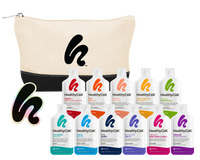The human brain is an entirely different galaxy within itself, capable of producing all of your memories, emotions, feelings, sensations, and everything else that makes you unique.
It also controls your movements while receiving, processing, and interpreting information.
The brain performs countless functions daily, requiring a consistently large amount of power and targeted nutritional support to work its best.
According to a report from Scientific American, the brain uses an estimated 20 percent of the body's energy supply on a daily basis.
Its main energy source is glucose, the majority of which is funneled to the neurons, although it can use alternate fuels.
Neurons transmit information to different parts of the brain, between the brain, and throughout the rest of your nervous system.
Neuron cells have the highest energy demand and require a continuous supply of glucose from your circulatory system.
Glucose is just one piece of the puzzle, however.
Scientists have been working on a list of 'Brain Essential Nutrients (BEN),' and are developing the BEN scale to determine how important each one is for overall brain health.
Other essential nutrients for brain health include long-chain Omega 3 fatty acids, magnesium, calcium, fiber, and vitamins B1, B9, B12, D and E.
Water is also important for brain health, as the organ is comprised of about 73% water according to one estimate.
Brain Foods: What They Are, and Why They're Important
Brain-boosting foods vary across different food, vitamin, and mineral groups, but some similarities exist.
Foods that are high in healthy fats, such as coconut, avocado and fatty fish are among the most effective brain foods.
Plant-based, brain-boosting foods also tend to be higher in antioxidants, which are substances found in foods that inhibit oxidation and oxidative damage to the cells, including brain cells.
Foods containing B vitamins are also typically high on the list of the top brain foods, as these foods have been proven to reduce stress and boost both brain and nervous system health.
The standard American diet is filled with foods like trans fats, aspartame, alcoholic beverages, pesticides, fluoride and more.
For these reasons and plenty of other reasons, adding more brain-boosting foods and vitamins to your diet is advised.
The Brain's Feel Good Hormones – What You Need to Know
There are four chemicals that promote feelings of happiness and contentment in the brain: dopamine, serotonin, endorphins and oxytocin.
Dopamine produces an intense feeling of reward. We are often driven to seek this chemical through pursuits and goal-setting.
Serotonin is responsible for boosting mood and is generally what allows us to stay content even when things aren't too exciting.
Endorphins are the brain's natural pain reliever and are similar to the substances found in opioid painkillers (which come with many serious side effects).
Endorphins are released during exercise, meditation, sex, laughter, listening to music, and similar joyful activities.
The last chemical on the list is oxytocin.
Oxytocin is the bonding chemical that is released through physical touch, music, and exercise.
These chemicals are often released as the result of activities we engage in, but without the right nutritional building blocks, we won't be able to experience them nearly as often as we'd like.
The Top Brain Foods to Add to Your Routine
The following foods are some of the best for brain health, according to scientific research.
These foods each offer unique properties that support brain health in various ways.
The more you add these foods to your daily diet, the healthier your brain will become over time.
1. Coconut- Coconut oil and its cousin MCT oil is capable of supporting brain health by providing an alternate source of fuel, medium chain fatty acids. The latter is a concentrated form of coconut oil that has been shown to improve cognition in Alzheimer's patients.
Coconut oil may also improve insulin resistance, which may help dementia patients and those who suffer from diabetes.
2. Blueberries- Blueberries are a superstar brain food for various reasons.
These berries are typically harvested from June through early August and offer excellent health benefits, either fresh or frozen.
Research shows that blueberries help to increase blood flow to key areas of the brain, improve memory function and increase attention to required tasks.
Blueberries may also guard against DNA damage because of their high antioxidant content, and a cup of blueberries each day may prevent brain cell degeneration, offering protection against neurological diseases like Parkinson's Disease.
3. Green Tea- Green tea is a classic health drink that contains the amino acid L-theanine and a moderate amount of caffeine.
Caffeine is a love-it or hate-it thing for most people, but green tea and L-theanine offer a lower dose compared to coffee.
According to Harvard Health, caffeine users usually score better on mental aptitude tests.
Green tea's signature amino acid has also been shown to help relieve stress-related disorders and to improve mood, adding to its reputation as superlative brain food.
4. Fatty, Wild-Caught Fish- Fatty, wild-caught fish is one of five foods named by Harvard Health as the best for brain health.
Fish like salmon contain Omega-3 fatty acids, which have been shown to sharpen memory and improve mood while preventing cognitive decline.
Most people have too many Omega 6 fatty acids in their system, but Omega 3s can balance the ratio.
Omega 3s also help improve neurotransmitter binding and signaling in the brain.
In addition to adding these memory-boosting foods, HealthyCell’s Focus & Recall performance blend contains a balanced ratio of all three Omega fatty acids (3s, 6s and 9s), a small dose of caffeine, B vitamins, and more.
This blend supports focus, concentration, recall, alertness and cognition for optimal brain health.




